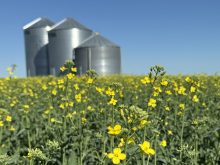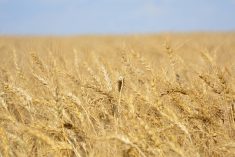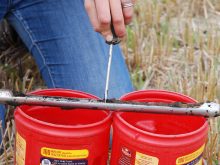The head of the Canadian Grain Commission says farmers should be sure they are growing registered varieties.
The switch from kernel visual distinguishability to signed declaration forms at delivery has revealed that some farmers are growing varieties that have dropped off the registration list.
Elwin Hermanson told the Agricultural Producers Association of Saskatchewan annual meeting that even if wheat is No. 1 quality, it automatically goes into the feed wheat class if it’s not on the list. Unregistered durum varieties drop to No. 5.
“Be very sure of what grain is in what bin,” he said. “Know your seed.”
Read Also

AI expected to make itself felt in food systems
Artificial intelligence is already transforming the food we eat, how farmers produce it and how it reaches the consumer, experts say
Some farmers have been surprised to learn their wheat isn’t on the list.
“We’ve been in discussions with the CFIA (Canadian Food Inspection Agency) and both agree that we need to communicate better with the industry when we are deregistering varieties, and we probably need a greater time frame in which to go through that process,” he said after his presentation.
That would include more time to move the deregistered varieties out of the system so that they don’t linger, Hermanson said.
For example, Pelissier durum was first registered in 1929 and is no longer on the list. Invader spring wheat is also deregistered.
“We’re finding there’s a little bit out there, not a lot,” he said. “It’s not a big problem, but if you happen to have it, it is.”
He reminded farmers that the declaration form is a legal document.
Hermanson said he hoped a more formal process to better notify farmers about deregistrations would be in place soon.
“A quick change on a website isn’t enough.”
Former APAS president Terry Hildebrandt asked how the system is policed and what penalties are in place.
Hermanson said if the changes to Canada’s Grain Act had been passed, then monetary penalties would have been available. There is nothing under the current act to determine penalties.
The chief commissioner also encouraged farmers to protect themselves during the economic downturn. The CGC requires adequate security from licensed grain companies and regularly monitors them.
“Given the volatility of the grain markets over the past year, up and down, and the uncertainty with the credit crunch, we’ve been more vigilant than we have in the past,” he said. “That being said, we can’t promise to have 100 percent of our bases covered because the industry is far bigger and the transactions are far more numerous than can be reviewed on a case by case basis.”
Farmers’ best insurance is to deposit their payments as soon as possible.
Hermanson said many farmers wait two or three weeks for a cheque and then a similar period of time before depositing it.
CGC security lasts only for 30 days after a cheque is issued, including deferred cheques. Farmers who wait two or three months to cash the cheque could get caught if there is a financial problem, he said.
“We’ve even encouraged the industry, producers, to go to direct deposit,” he added. “It just reduces the exposure and it reduces the liabilities that the grain companies carry and it improves the chances of the farmers being paid.”
















